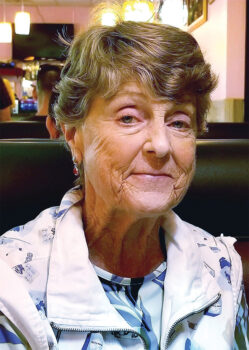 Deb Kresnicka and Tiggy Shields
Deb Kresnicka and Tiggy Shields
My daughter’s memory is that I never could hear well. I didn’t recognize how severe this was until I took a physical in 1985 for a new job. The hearing test indicated that my right ear didn’t detect sounds as it should. An ear, nose, and throat (ENT) doctor diagnosed otosclerosis and recommended surgery. Otosclerosis, an inherited disorder, happens when (most often) the stapes, one of three bones in the ear, does not vibrate. This vibration makes the fluids in the cochlea move in a wave-like manner, stimulating the hair cells. My stapes were sclerosed, or hardened in place.
In that time of the mid-1980s, the recommended surgery for my condition, a stapedectomy, did not have a high enough success rate for my comfort level. I decided against it. Over the following years, I tried several alternatives. As I know now was a very poor choice, I first took over my father’s right hearing aid (which did not meet his needs anymore) and had a new mold created for my ear. Amazingly, it helped with volume for a while. Then my Costco hearing aids that followed worked for about six years until a new ear mold with latex caused an allergic reaction. I felt so anxious to get my hearing problem resolved. Another doctor recommended surgery not long before we moved full time to SaddleBrooke and COVID-19 closed down the country.
This past winter, and fully vaccinated, I visited the University of Arizona Audiology Department and was referred to an excellent otolaryngologist who also teaches at the U of A. At my request, he conferred with my former doctor at Chicago Loyola. I finally agreed to follow their recommendation for surgery. The procedure, administered through my ear canal, took only one and a half hours and involved a small implant of plastic and titanium. Six weeks post-op, my hearing test showed that I had failed the “word” test. I was devastated, but with a little more patience and a few more weeks of healing, the miracle finally happened. I could hear again in my right ear!
I feel so grateful and blessed. Yes, my journey had real ups and downs, and I was anxious about surgery, but I’m thankful that through the disappointments, delays, and fear, I hung in there and finally got this new lease on hearing. If you are struggling with hearing, take action. Hearing loss can occasionally be a result of conditions beyond just nerve damage. Don’t be afraid. Do the research and find a doctor you are comfortable with and trust. Even get a second opinion, but be proactive. Turn your life around to better hearing.
The Discussion Group for Better Hearing meets the second Friday of every month at 10 a.m. in the Sonoran Room of the MountainView Clubhouse. Email Jennifer Jefferis at [email protected] or Lyle Larson at [email protected] for more information.
